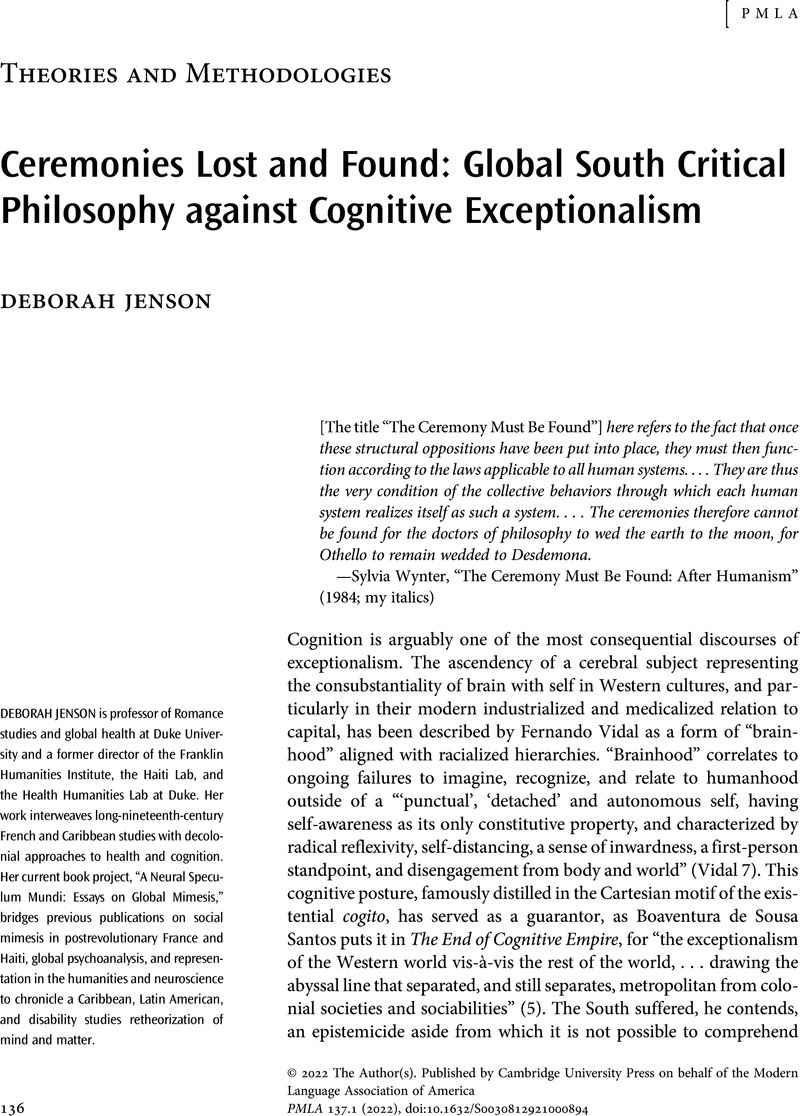No CrossRef data available.
Article contents
Ceremonies Lost and Found: Global South Critical Philosophy against Cognitive Exceptionalism
Published online by Cambridge University Press: 04 March 2022
Abstract
An abstract is not available for this content so a preview has been provided. Please use the Get access link above for information on how to access this content.

- Type
- Theories and Methodologies
- Information
- Copyright
- Copyright © 2022 The Author(s). Published by Cambridge University Press on behalf of the Modern Language Association of America
References
Works Cited
Bateson, Gregory. “Conscious Purpose versus Nature.” The Dialectics of Liberation, edited by Cooper, David, et al. 1968. Verso, 2015.Google Scholar
Baudrillard, Jean. The Mirror of Production. Translated by Poster, Mark, Telos Press, 1975.Google Scholar
Bishop, John Peale. “Speaking of Poetry.” All Poetry, allpoetry.com/Speaking-Of-Poetry.Google Scholar
Bogues, Anthony. After Man, toward the Human: Critical Essays on Sylvia Wynter. Ian Randle, 2006.Google Scholar
Chancy, Myriam J. A. Autochthonomies: Transnationalism, Testimony, and Transmission in the African Diaspora. U of Illinois P, 2020.Google Scholar
Coquery-Vidrovitch, Catherine, and Mesnard, Éric. Être esclave: Afriques-Amériques, XV–XIXe siècle. Éditions la Découverte, 2013.CrossRefGoogle Scholar
Diagne, Souleyman Bachir. The Ink of Scholars: Reflections on Philosophy in Africa. Translated by Adjemian, Jonathan, CODESRIA, 2016.CrossRefGoogle Scholar
Firmin, Anténor. De l’égalité des races humaines: Anthropologie positive. Pichon, 1885.Google Scholar
Hantel, Max. “What Is It Like to Be a Human? Sylvia Wynter on Autopoiesis.” philoSOPHIA, vol. 8, no. 1, 2018, pp. 61–79.CrossRefGoogle Scholar
Haraway, Donna. “Anthropocene, Capitalocene, Plantationocene, Chthulucene: Making Kin.” Environmental Humanities, vol. 6, 2015, pp. 159–65.CrossRefGoogle Scholar
Hayles, N. Katherine. Unthought: The Power of the Cognitive Nonconscious. U of Chicago P, 2017.CrossRefGoogle Scholar
Hegel, G. W. F. “Hegel's Philosophy of Right: Preface.” Translated by Dyde, S. W., Marxists.org, www.marxists.org/reference/archive/hegel/works/pr/preface.htm#xxvii.Google Scholar
Hegel, G. W. F. The Philosophy of History. Translated by Sibree, J., Batoche Books, 2001.Google Scholar
Hegel, G. W. F. “Preface to the Second Edition.” Hegel's Science of Logic, Marxists.org, www.marxists.org/reference/archive/hegel/works/hl/hlprefac.htm#HL1_28aa.Google Scholar
Herman, David. “Regrounding Narratology: The Study of Narratively Organized Systems for Thinking.” What Is Narratology? Questions and Answers regarding the Status of a Theory, edited by Kindt, Tom and Müller, Hans-Herald, Walter de Gruyter, 2003, pp. 303–32.Google Scholar
Kant, Immanuel. Essays and Treatises on Moral, Political, Religious and Various Philosophical Subjects. Translated by Richardson, William, vol. 2, William Richardson, 1799.Google Scholar
King, Joyce E. “Perceiving Reality in a New Way: Rethinking the Black/White Duality of Our Times.” After Man, towards the Human: Critical Essays on Sylvia Wynter, edited by Bogues, Anthony, Ian Randle, 2006, pp. 25–56.Google Scholar
Mackay, Ian Reay, and Anderson, Warwick. Intolerant Bodies: A Short History of Autoimmunity. Johns Hopkins UP, 2014.Google Scholar
McKittrick, Katherine. “Axis, Bold as Love: On Jimi Hendrix, Sylvia Wynter, and the Promise of Science.” McKittrick, Sylvia Wynter, pp. 142–64.Google Scholar
McKittrick, Katherine., editor. Sylvia Wynter: On Being Human as Praxis. Duke UP, 2015.Google Scholar
Mignolo, Walter. “Sylvia Wynter: What Does It Mean to Be Human?” McKittrick, Sylvia Wynter, pp. 106–23.Google Scholar
Pascal, Blaise. Pascal's Pensées. Translated by Trotter, William Finlayson, Digireads, 2018.Google Scholar
Rosch, Eleanor. “Introduction to the Revised Edition.” The Embodied Mind: Revised Edition: Cognitive Science and Human Experience, edited by Francisco J. Varela et al., MIT Press, 2017, pp. xxxv-lv.Google Scholar
Santos, Boaventura de Sousa. The End of Cognitive Empire: The Coming of Age of Epistemologies of the South . Duke UP , 2018.Google Scholar
Santos, Boaventura de Sousa, et al. “Opening Up the Canon of Knowledge and the Recognition of Difference.” Introduction. Another Knowledge Is Possible: Beyond Northern Epistemologies, edited by Santos, , Verso, 2007, pp. xix–lxii.Google Scholar
Savarese, Ralph J. “Toward a Postcolonial Neurology: Autism, Tito Mukhopadhyay, and a New Geo-poetics of the Body.” Journal of Literary and Cultural Disability Studies, vol. 4, no. 3, 2010, pp. 273–89.CrossRefGoogle Scholar
Sharma, Nandita. “Strategic Anti-Essentialism: Decolonizing Decolonization.” McKittrick, Sylvia Wynter, pp. 164–82.Google Scholar
Thompson, Evan. “Introduction to the Revised Edition.” The Embodied Mind: Revised Edition: Cognitive Science and Human Experience, edited by Varela, Francisco J. et al. , MIT Press, 2017, pp. xvii–xxxiii.Google Scholar
Varela, Francisco J. “The Emergent Self.” Edge, www.edge.org/3rd_culture/varela/varela_print.html.Google Scholar
Vidal, Fernando. “Brainhood, Anthropological Figure of Modernity.” History of the Human Sciences, vol. 22, no. 1, 2009, pp. 5–36.CrossRefGoogle ScholarPubMed
Wynter, Sylvia. “Africa, the West, and the Analogy of Culture.” Symbolic Narratives / African Cinema: Audiences, Theory and the Moving Image, edited by Giovanni, Jules, British Film Institute, 2000, pp. 21–38.Google Scholar
Wynter, Sylvia. “The Ceremony Found: Towards the Autopoietic Turn/Overturn, Its Autonomy of Human Agency and Extraterritoriality of (Self-)Cognition.” Black Knowledges / Black Struggles: Essays in Critical Epistemology, edited by Ambroise, Jason R. and Broeck, Sabine, Liverpool UP, 2015.Google Scholar
Wynter, Sylvia. “The Ceremony Must Be Found: After Humanism.” Boundary 2, vol. 12, no. 3–vol. 13, no. 1, spring–autumn 1984, pp. 19–70.CrossRefGoogle Scholar
Wynter, Sylvia. “The Pope Must Have Been Drunk, the King of Castile a Madman: Culture as Actuality, and the Caribbean Rethinking Modernity.” The Reordering of Culture: Latin America, the Caribbean and Canada in the Hood, edited by Ruprecht, Alvina and Taiana, Cecilia, McGill Queens UP, 1995, pp. 17–41.Google Scholar
Wynter, Sylvia. “Tras el ‘Hombre,’ su última palabra: Sobre el posmodernismo, les damnés y el principio sociogénico.” Translated by Ignacio Corona-Gutiérrez, Nuevo Texto Critico, vol. 6, no. 7, 1991, pp. 43–83.CrossRefGoogle Scholar
Wynter, Sylvia. “Unsettling the Coloniality of Being/Power/Truth/Freedom: Towards the Human, after Man, Its Overrepresentation—an Argument.” New Centennial Review, vol. 3, no. 3, fall 2003, pp. 257–337.CrossRefGoogle Scholar
Wynter, Sylvia, and McKittrick, Katherine. “Unparalleled Catastrophe for Our Species?; or, To Give Humanism a Different Future: Conversations.” McKittrick, Sylvia Wynter, pp. 9–89.Google Scholar




